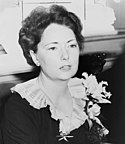Margaret Mitchell Quote
Accepting Uncle Tom’s Cabin as revelation second only to the Bible, the Yankee women all wanted to know about the bloodhounds which every Southerner kept to track down runaway slaves. And they never believed her when she told them she had only seen one bloodhound in all her life and it was a small mild dog and not a huge ferocious mastiff. They wanted to know about the dreadful branding irons which planters used to mark the faces of their slaves and the cat-o’-nine-tails with which they beat them to death, and they evidenced what Scarlett felt was a very nasty and ill-bred interest in slave concubinage.Especially did she resent this in view of the enormous increase in mulatto babies in Atlanta since the Yankee soldiers had settled in the town.
Accepting Uncle Tom’s Cabin as revelation second only to the Bible, the Yankee women all wanted to know about the bloodhounds which every Southerner kept to track down runaway slaves. And they never believed her when she told them she had only seen one bloodhound in all her life and it was a small mild dog and not a huge ferocious mastiff. They wanted to know about the dreadful branding irons which planters used to mark the faces of their slaves and the cat-o’-nine-tails with which they beat them to death, and they evidenced what Scarlett felt was a very nasty and ill-bred interest in slave concubinage.Especially did she resent this in view of the enormous increase in mulatto babies in Atlanta since the Yankee soldiers had settled in the town.
Related Quotes
About Margaret Mitchell
Mitchell was struck and killed by a speeding drunk driver in 1949.
